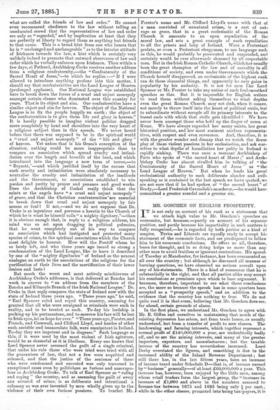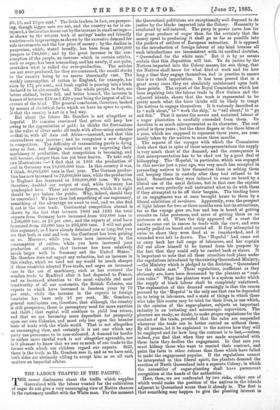MR. GOSCHEN ON ENGLISH PROSPERITY.
IT is not only on account of his rank as a statesman that we attach high value to Mr. Goschen's speeches on economics, but because,—partly on account of his separate position, and partly because his impartiality in such matters is fully recognised,—he is regarded by both parties as a kind of umpire. Tories and Liberals are equally ready to accept his statement of the economic facts, and are predisposed to follow him to his economic conclusions. He offers us all, therefore, bases for thought, and in so doing helps us more than any other man to avoid fruitless or ignorant contentions. His speech of Tuesday at Manchester, for instance, has been commented on all over the country; but although he discussed all manner of burning questions, we have observed no serious assault upon any of his statements. There is a kind of consensus that he is substantially in the right, and that all parties alike may accept his conclusions as premisses upon which to base argument. It becomes, therefore, important to see what these conclusions are, the more so because the speech has in some quarters been accepted as a "prosperity speech," and an addition to the evidence that the country has nothing to fear. We do not quite read it in that sense, believing that Mr. Goschen does see, far ahead, certain grounds of alarm.
In the first place, we understand Mr. Goschen to agree with Mr. R. Giffen and ourselves in maintaining that much of the existing depression has arisen, not from trade losses, as usually understood, but from a transfer of profit to new classes. The landowning and farming interests, which together represent a normal profit of £140,000,000 a year, are undoubtedly badly off, and so are the mining interests, and many of the greater importers, exporters, and manufacturers ; but the taxable income of the country has nevertheless increased. Lord Derby overstated the figures' i and something is due to the increased ability of the Inland Revenue Department ; but still there has, in the last fifteen years, been an increase of income taxed under Schedule D—that is, of income earned by "business" generally—of at least £60,000,000 a year. This increase has, however, been enjoyed 'by the little men, among whom retail 'traders form the largest group, the "increase in incomes of f11000 and above in the numbers assessed to Income-tax between 1875 and 1883 being only per cent, while in the ether classes, promoted into being tax-payers, it is 20, 15, and 13 per cent." The little traders, in fact, are prospering, though bigger men are not, and the country so far is un injured, a declaration borne out by the increase in small savings— as shown by the returns both of savings' banks and friendly societies—in large savings, as shown by the excessive demand for safe investments and the low price of money ; by the decline in pauperism, which, stated broadly, has been from 1,000,000 paupers to 700,000; and by the great increase in the con sumption of the people, an increase which in certain articles, such as sugar, has been astounding, and has nearly, if not quite, overtaken what is called the over-production. The articles are not over-produced, for they are consumed, the unsold stocks in the country being by no means abnormally vast. The weekly consumption of cotton in England, for example, has risen by 17i per cent., and fresh capital is pouring into a trade declared to be abnormally bad. The whole people, in fact, are better clothed, better fed, and better housed, the increase in houses of between £10 and £20 a year being the largest of all increases of the kind. The general conclusion, therefore, backed by masses of statistical facts which we have no space to quote, is that the country is not in a bad way. But about the future Mr. Goschen is not altogether so hopeful. He remains convinced that prices will keep low owing to the appreciation of gold ; he thinks the fluctuations in the value of silver make all trade with silver-using countries —that is, with all Asia and Africa—unsound, and that this unsoundness may increase ; and he recognises a new danger in competition. The difficulty of transmitting goods is dying away so fast, and foreign countries are so improving their machinery of production, that competition is becoming, and will become, sharper than has yet been known. To take only two illustrations :—" I find that in 1861 the production of coal in Germany was 18,000,000 tons. In this country it was, I think, 80,000,000 tons in that year. The German production has now increased to 72,000,000 tons, while the production in England has increased to 160,000,000 tows. We have, therefore, doubled our output of coal, while Germany has quadrupled hers. These are serious figures, which it is right should be put before the public. Why, indeed, should they be concealed ? We have thus lost something of our supremacy, something of the advantage we owed to coal, and we also find it out in the iron trade. Continental competition abroad is shown by the fact that between 1880 and 1883 the total exports from Germany have increased from 992,000 tons to 1,230,000 tons, or 25 per cent., and the exports of steel have increased from 62,000 tons to 203,000 tons. I will not push this argument, as I have already detained you so long, but you see that both in coal and iron the Continent has been gaining on us. Moreover, while you have been increasing in the consumption of cotton, while you have increased your production of cotton, that increase has been relatively much larger both in Germany and the United States." Mr. Goschen does not expect any reduction, but an increase in this rivalry, which we need not say would be much sharper if these countries adopted Free-trade, and urges an increased care in the use of machinery, such as has restored the woollen trade to Bradford after it had departed to France, -and an increased attention to the most valuable and most trustiorthy of all our customers, the British Colonies, our exports to which have increased in fourteen years by 70 per cent., while the increase in the exports to foreign countries has been only 16 per cent. Mr. Goschen's general conclusions are, therefore, that although the country is still prosperous, there is peremptory need for more exertion and thrift ; that capital will continue to yield less return, and that we are becoming more dependant for prosperity upon our own Colonies, and must rely less upon the broader basis of trade with the whole world. That is not altogether an encouraging view, and certainly it is not one which any party can pronounce to be rose-coloured. A demand for harder or rather more careful work is not altogether agreeable, nor is it pleasant to know that we owe so much of our trade to the favour with which our children regard our exports. Still, there is the truth as Mr. Goschen sees it, and as we have said, both sides are obviously willing to accept him as on all such matters an impartial arbiter.



































 Previous page
Previous page